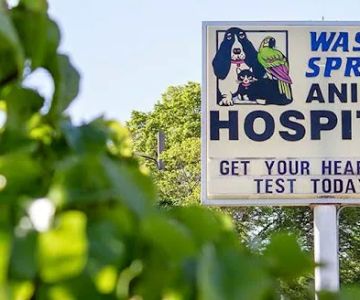Can Humans Get Sick at a Veterinary Hospital? Understanding the Risks and Precautions
As pet owners, we know how important it is to take our furry friends to the veterinary hospital when they’re feeling unwell. However, a common question that arises is whether humans can get sick at these clinics. After all, veterinary hospitals are full of animals, many of which may have contagious diseases. As someone who has visited multiple veterinary hospitals over the years, I’ve often wondered about the potential risks for myself and my family. In this article, we will explore the possible dangers of getting sick at a veterinary hospital, discuss precautions that can be taken, and explain how the risk of illness can be minimized.
1. The Potential for Zoonotic Diseases
One of the primary concerns when visiting a veterinary hospital is the risk of zoonotic diseases. These are diseases that can be transmitted from animals to humans. Zoonotic diseases can range from mild to severe, and they are more common than many people realize. Common examples include ringworm, toxoplasmosis, and salmonella, but there are many other lesser-known diseases that can also be contracted through contact with infected animals. The risk of transmission is higher for individuals with weakened immune systems, young children, and the elderly.
In my experience, I’ve learned that zoonotic diseases are generally transmitted through direct contact with an infected animal, its bodily fluids, or contaminated surfaces. For example, petting an animal with a skin infection, handling its waste, or even touching a surface that an infected animal has been on, could potentially lead to the spread of disease. While this may sound concerning, it’s important to note that veterinary clinics are well-equipped to manage these risks through proper hygiene protocols.
2. Veterinary Hospital Hygiene and Safety Protocols
Veterinary hospitals follow strict hygiene and sanitation protocols to minimize the risk of disease transmission. I’ve seen firsthand how these facilities maintain cleanliness by disinfecting surfaces, tools, and equipment between uses. The staff is well-trained to recognize signs of contagious diseases in animals, and they take extra precautions when dealing with sick or potentially infectious animals.
For example, many veterinary hospitals separate animals that have contagious diseases from other patients to prevent cross-contamination. In addition, doctors and nurses wear gloves, masks, and other protective gear when treating animals that could pose a risk to human health. By following these protocols, veterinary clinics reduce the chance of humans contracting diseases from animals.
3. Preventative Measures You Can Take
As a responsible pet owner, there are several measures you can take to protect yourself from getting sick at the veterinary hospital. Here are a few tips that have helped me feel more confident when visiting these facilities:
- Wash your hands: This is one of the most important preventative measures. Always wash your hands thoroughly with soap and water after handling animals or touching surfaces in the clinic. If hand washing isn’t possible, use hand sanitizer.
- Avoid direct contact: Try not to touch the animals unless necessary. If you do, ensure that you wash your hands immediately afterward.
- Keep your pet clean: Make sure your pet is healthy and free from diseases before taking them to the clinic. Regular checkups can help catch any potential problems early on.
- Request sanitation practices: Don’t hesitate to ask the clinic about their sanitation practices. A good veterinary hospital will be transparent and willing to reassure you about their cleanliness protocols.
4. When to Be Extra Cautious
While the risk of contracting an illness at a veterinary hospital is generally low due to strict sanitation measures, certain situations can increase the likelihood of exposure. For example, if you have a weakened immune system, it’s important to take extra precautions when visiting a veterinary hospital. Additionally, if you notice an animal that looks visibly ill or is exhibiting unusual behavior, it’s best to ask the staff for extra precautions. They can provide you with additional safety guidelines, such as avoiding specific areas or wearing extra protective gear.
Personally, I’ve found that avoiding close contact with unfamiliar animals, especially those that seem unwell, can significantly lower the chances of exposure. If you’re uncertain about any animals you encounter at the clinic, ask the staff for guidance on how to minimize the risk of contracting any potential diseases.
5. Common Misconceptions About Getting Sick at a Veterinary Hospital
One misconception I’ve encountered is that all animals in a veterinary hospital are dangerous or that the hospital is a breeding ground for disease. In reality, most veterinary hospitals go to great lengths to ensure the safety of both animals and humans. Yes, there are risks, but the likelihood of getting sick is minimal if proper precautions are followed.
Another common myth is that pets themselves are dangerous to humans. While it’s true that some diseases can be transmitted from pets to humans, the risk of contracting these diseases is relatively low if you follow basic hygiene practices. It’s also important to note that animals often carry diseases without showing symptoms, so regular veterinary checkups and preventative care are essential to keeping both your pet and yourself safe.
6. Why Veterinary Hospitals Are Still Safe
Despite the potential risks of getting sick at a veterinary hospital, I believe these facilities are still one of the safest places to take your pet. The veterinary staff are highly trained professionals who prioritize hygiene, safety, and patient care. They take every possible step to ensure that both pets and their owners are protected from harmful diseases.
Additionally, by being proactive about your health and following the recommended safety protocols, you can greatly reduce the chances of exposure. Veterinary hospitals are essential for the health and well-being of pets, and with the right precautions, you can feel confident about your visits.











